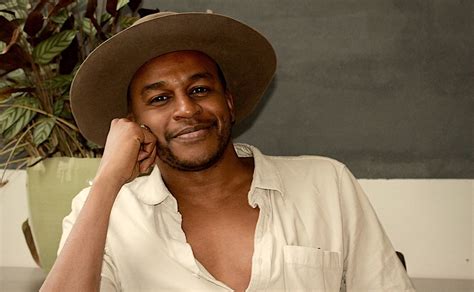A Quote by Alan Lightman
I think what gets you through a small writing project, is just one burst of inspiration. A book, especially a longer book, it's a different kind of force that pushes you through it. It's a vision of the whole thing.
Related Quotes
For me, a lot of Discipline was very personal writing, like writing through and working out being inside this gendered body and also the compulsions of the body, the muting of the mind as driven by the body. My father had died some years ago so he haunts the book too, just floats through it ghost-like. But, the writing of every book is different for me. They are so like living creatures, these books, so I don't know what's carried over into the writing of the next things - except maybe that I'm best when I make my writing practice a routine.
Some writers are writing one great, big book and just taking all these different avenues towards it. They might seem on the outside to be different, but they're really not. And that's a different kind of mindset. I don't know why it is, but I just feel like I really want to escape myself as much as I can - myself as the artist, or as the writer, or as the thinker - with each new project, because one, it's just boredom, but also, I guess I just feel most comfortable starting a new book if I just feel a little in the dark about it.
The whole thing of working in all these different mediums, it's just so that I can always be playing hooky from one of them. I can always be rebelling against my boss. Like, I'm supposed to be writing this book, but - heh heh heh - I'm writing a movie, secretly. I'm procrastinating, and in my off-hours I'm working on this movie that I'm not allowed to do, because I'm supposed to be writing a book!
"The Diagnosis" had ten drafts of very significant changing, where I went through the whole book, wholesale and changed everything. Then the last year or so it was making small changes. I would do something and let it sit for three months... just brood about and decide I needed to slightly change something here or there. Or one character wasn't quite right. But I think everybody goes through this.
I began writing books after speaking for several years and I realize that when you have a written book people think that you're smarter than you really are if I can joke. But it's interesting. People will buy your book and hire you without reading the book just because you have a book and you have a book on a subject that they think is of interest to themselves or e to their company.
When you go into the whole realm of creating your own music and seeing the project through, it's increasingly difficult because nowadays a lot of people are making music all on their own - the individual instead of the band. And when you have such a solid vision and you spend so much time working on one idea and allowing it to manifest in your mind through a record, and then you have to go and find people to help you see it through live, it gets really overwhelming, to have to project and really clearly state what you're trying to do and how you want them to do it.
Write what you want to read. So many people think they need to write a particular kind of book, or imitate a successful style, in order to be published. I've known people who felt they had to model their book on existing blockbusters, or write in a genre that's supposed to be "hot right now" in order to get agents and publishers interested. But if you're writing in a genre you don't like, or modeling yourself on a book you don't respect, it'll show through. You're your first, most important reader, so write the book that reader really wants to read.
It's insane to be a writer and not be a reader. When I'm writing I'm more likely to be reading four or five books at once, just in bits and pieces rather than subjecting myself to a really brilliant book and thinking, "Well what's the point of me writing anything?" I'm more likely to read a book through when I take a break from writing.
In re-reading 'Presumed Innocent,' the one thing that struck me - and I re-read the book four different times in writing 'Innocent,' interested in different things each time - but I did think there were a couple of extra loops in the plot that I probably didn't need. The other thing that sort of amazed me was how discursive the book was.




































